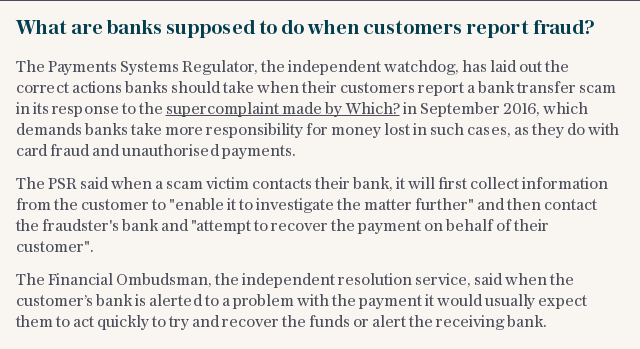'I lost £600,000 in a conveyancing scam – why will no one help?' Amelia Murray,The Telegraph, 12 Mar 2018

The victim of a devastating conveyancing scam has been left feeling “utterly alone” following the theft of almost £600,000. The sum, which he borrowed from his own company for a property purchase, is the largest loss ever reported by Telegraph Money regarding this type of fraud.
The 50-year-old restaurateur, who wishes to remain anonymous, said he’s been given no information “of any substance” from his bank, NatWest, since being tricked by a fraudster posing as his solicitor over email. He did not receive a courtesy call or offer of support from the bank until intervention from this newspaper.
Ulster Bank, which received the stolen funds, has also not told him much, the victim said, and for weeks he has had no idea if the police were investigating his complaint since reporting the crime more than a month ago.
He said: “My life has been destroyed and no one wants to speak to me. I go to bed every night not knowing what is happening. The longer it goes on, the more I fear for the worst.”
Hundreds of people have been tricked by conveyancing scams in the past few years and the losses can be life-changing. Action Fraud, the UK’s cybercrime and reporting service, received 120 reports between January and September last year.
Victims lost £68,119 on average. The highest figure reported by Action Fraud was £988,091.

Fraudsters are able to gain access to computer systems and intercept emails between home buyers or sellers and their solicitors. As the discussion turns to payments, the criminals, posing as the solicitor usually using a spoofed email address, advise the money should be paid into an alternative account.
The reader began corresponding over email with his solicitor from Langleys, a firm based in Yorkshire, last November after finding a flat he liked in Hertfordshire, following his divorce.
In December he received an email from another email address asking if funds were available. This message was sent from a Gmail account but contained the name of his solicitor and the firm.
The reader, who runs a restaurant in London’s West End, said he had experience of firms using two email addresses, such as his divorce lawyer, so did not question the email’s legitimacy.
He said he also felt reassured when he saw the company name. But this unfortunately was the first contact he’d had with the fraudster.
The criminal emailed again a few days later requesting the funds be transferred to the vendor’s solicitor to ensure they would be able to complete by the end of January.

The victim said he continued to email both the bogus solicitor and the genuine one. On one occasion in January, both addresses were included in the same email.
But this was not picked up by the solicitor at Langleys, the reader said.
The reader, whose mortgage had yet to come through, said he felt under immense pressure to make the transfer. He borrowed from his company and made a bank transfer of £593,055.20 to an Ulster Bank account, the Irish arm of Royal Bank of Scotland, on Jan 18, as per the fake solicitor’s instructions.
The ruse was only discovered on Feb 9 when the victim found out the real solicitor had no knowledge of the transfer. The crime was reported immediately to NatWest, Ulster Bank and Action Fraud. The reader also tried to report the scam to various London police stations but was referred back to Action Fraud or told to call 101.
“No one seemed to have any record of my name, reference number and the case. And I’ve no idea what to do,” he said.
Victims of scams should contact their bank as soon as they discover they’ve been conned and ask them to contact the recipient bank and freeze the account, said Suzanne Raftery, a former Metropolitan Police detective and head of investigations at Requite Solutions, a scam recovery business.
The difficulty is getting through to the right member of bank staff or department.
“Victims also often find themselves on hold for hours at a time,” she said.
Ms Raftery also suggested contacting the banks on social media, such as Twitter and Facebook, if you're struggling to get through. This not only draws public attention to the matter, putting pressure on the banks to respond, but also creates an audit trail.
If someone at the bank gives you information, ask for it in writing. Keep note of every phone call, the times and what was said.
You’ll need to log your case with Action Fraud, as this is the prescribed way, but Ms Raftery said it’s also worth calling or visiting your local police station.
- 'Police investigated my £66,000 fraud loss and told me Nationwide's procedures were substandard'
- 'HSBC finally paid me £4,000 after I was fleeced by one of its criminal customers'
Telegraph Money has consistently highlighted the role of the recipient bank in cases of bank transfer scams, known as “push payment fraud”.
We’ve called for the fraudster’s bank or building society to take more responsibility for allowing the criminals to open accounts, sometimes with fake documents, and to transfer large sums in and out without question.
Ulster Bank declined to comment or say how much of the funds remained. It refused to discuss the details of its account opening procedure and why such a large payment was not flagged up as suspicious.
NatWest said it was “aware” of the case and was currently investigating. It said it was “supporting” its customer in the recovery of his funds on a “best endeavours basis” and would “continue to support him through this undoubtedly distressing situation”.
It said it wanted to remind customers to always confirm bank details with their solicitor in person or over the phone before sending any money.
Detectives from Operation Falcon, the Metropolitan Police’s cybercrime investigation operation, are investigating but had made no arrests.
Langleys, the law firm, refused to comment.
https://sg.yahoo.com/finance/news/apos-lost-600-000-conveyancing-081000473.html
Comments